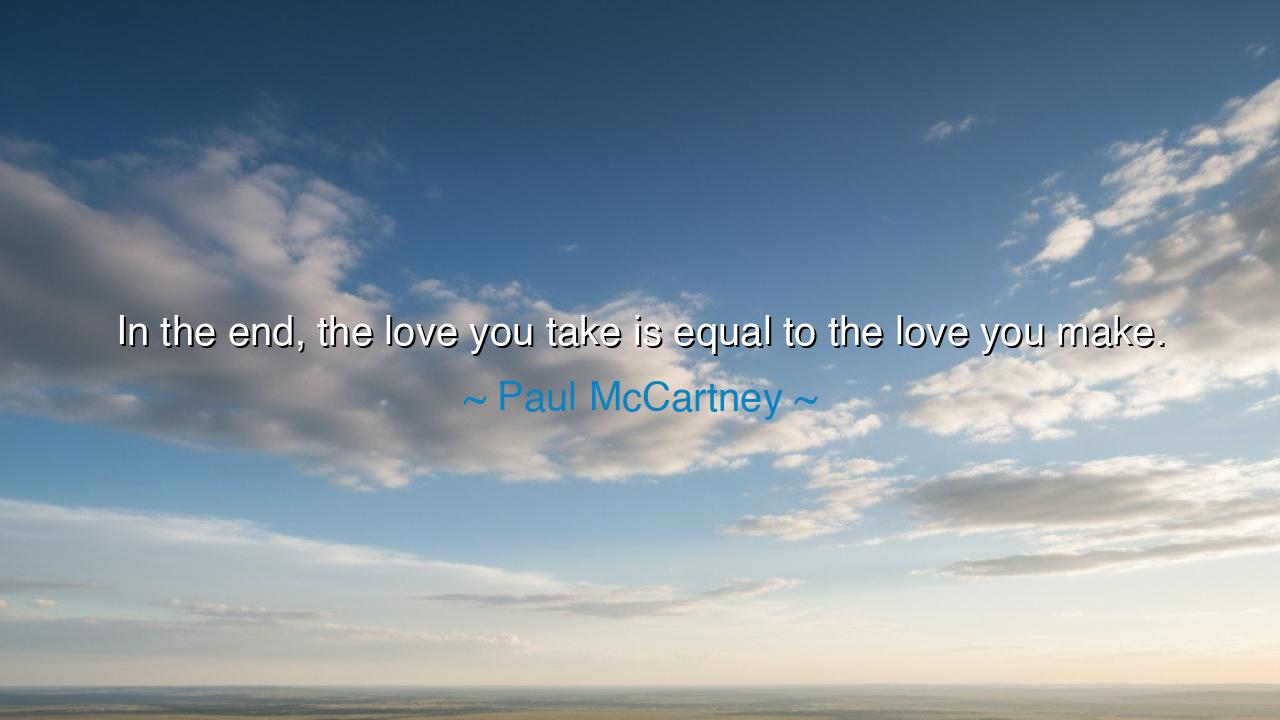
In the end, the love you take is equal to the love you make.






"In the end, the love you take is equal to the love you make." These profound words from Paul McCartney resonate deeply with the very essence of human existence. In them, McCartney touches on the ancient truth that love, in its purest form, is not a one-way transaction. Love is not something to be merely received or taken; it is something to be created, shared, and nurtured. The love we offer to others is what shapes the love we receive. It is an eternal cycle, a reflection of our hearts and actions, that carries through every relationship we have, whether with family, friends, or even the world itself.
The ancients understood that love was not an abstract concept, but a force that lived in the actions we take, in the way we treat one another, and in the energy we put into our lives. Aristotle, in his writings, spoke of philia, the deep bond of friendship and mutual respect. He believed that the most meaningful relationships were those that were mutually nourishing, where love was not just received, but also given in return. To love was not simply to feel affection, but to act with compassion, to build bonds, and to offer care. The love that we create with others, Aristotle would say, is the foundation of a life well-lived — and it is through these loving actions that we invite love into our own lives.
Consider the story of Socrates, the philosopher whose love for wisdom and for his fellow man led him to teach and debate in the streets of Athens. He gave his love freely, seeking to guide others toward a deeper understanding of virtue and truth. Yet Socrates’ love was not passive — it was active, driven by his belief that through dialogue and compassionate questioning, the hearts of his fellow Athenians could be uplifted. His love for truth and for the well-being of others created a lasting bond with those who learned from him. In the end, Socrates received much in return — not just admiration, but the eternal respect of generations. His life exemplified that the love you make, through actions rooted in kindness and wisdom, is indeed equal to the love you take from the world.
The Romans, too, held deep reverence for the role of love in building a strong, virtuous community. The concept of duty and honor within the family and the state was a reflection of their belief that love was the foundation of society. The great generals and leaders, like Cincinnatus, were not loved for their conquests alone, but for their ability to serve their people with selflessness and dedication. Cincinnatus, when called upon to defend Rome, did not seek glory or recognition; instead, he gave his service freely, understanding that love for his people and his country would be returned through the honor and respect he received. His story teaches us that love is not earned by seeking it, but by giving it away with a generous heart.
In our own lives, it is easy to become consumed by the desire to be loved, to look for validation in the form of admiration, attention, or affection. Yet, McCartney’s words remind us that true love is not something that can be pursued in isolation. To experience the love we seek, we must first offer it without hesitation or expectation of return. We often think that if we are loved, we will feel whole, but love is not a passive force; it is something that must be actively created, through kind acts, through understanding, and through compassion. To love deeply is to give without reservation, and in doing so, we invite that same love to come back to us.
Consider the story of Mahatma Gandhi, whose life was built on the principles of selfless love and service. Gandhi's love for his country and his people was not something he hoarded or kept for himself; it was a love that he expressed through action, through peaceful resistance, and through an unwavering commitment to justice. His actions spoke volumes, and in return, he received the love and respect of his nation and the world. Gandhi’s life is a testament to McCartney's wisdom: by creating love through his service and sacrifice, he was met with an outpouring of love and admiration that transcended his lifetime.
The lesson here is clear: love is a force that must be given to be received. What we give to others, whether through kindness, respect, or care, comes back to us in ways we may not always expect, but always in equal measure. McCartney’s words remind us that the love we take from the world is not something that just happens to us; it is a reflection of the love we create in our lives. By offering love freely, without hesitation or selfishness, we open ourselves to the deep joy and fulfillment that come from giving, knowing that it will return to us in full.
So, my children, remember this: if you wish to live a life full of love, do not wait for it to come to you. Make love your action, your intention, your offering to the world. By creating love in your words, your deeds, and your heart, you will find that the love you receive will be vast and abundant, as it mirrors the love you have made. Live with an open heart, give freely, and in the end, you will discover that the love you take is always equal to the love you make.






AAdministratorAdministrator
Welcome, honored guests. Please leave a comment, we will respond soon